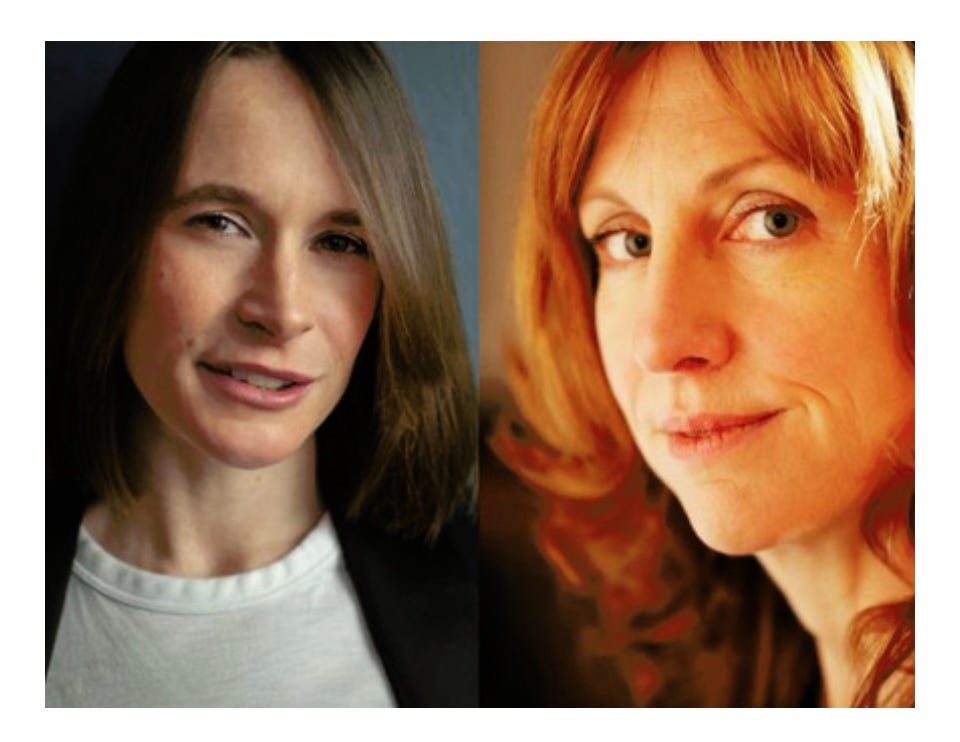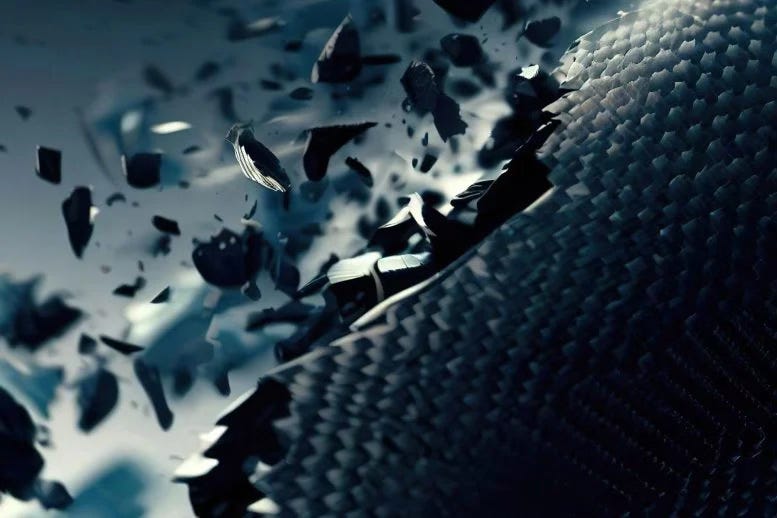Cracks of gold, threads of carbon
Literary repair and its limits—at 2025's Edinburgh International Book Festival
Monday Night Reads brings you thoughtful writing direct to your inbox every Monday at 7pm.
Check out The End of Nuance, my recent viral post about the Supreme Court judgement.
Letters from a Poet has over twenty specially recorded poems and letters reflecting on the writer’s life and topical subjects.
Paid subscribers can access the full serialisation of my popular debut novel Larchfield.
If you appreciate my work here, do consider supporting my writing with a paid subscription.
OCEAN, my new novel is out now. Billed by Louis de Bernieres as ‘strange, wonderful and compelling’ it’s the story of a family sailing the Atlantic to heal their broken lives after a terrorist explosion in London.
Dear Reader
My new novel Ocean begins its life in the world this week—at last the possession of readers, no longer just the mind of its author. I’m thrilled by its reception so far, and eager to see how it continues to land. I was especially pleased to be invited to appear at the Edinburgh International Book Festival this year. For authors who are only authors—not celebrities or cultural commentators—festivals are vital. They connect us to new audiences, to booksellers, to the conversations that sustain literary work.
When the 2025 theme was announced as Repair, I was genuinely moved. There is a lot to repair, on both the micro and macro levels, after activists compelled the festival to drop its connection with Baillie Gifford. Readers will know from my previous posts that last year I was reluctantly drawn into the world of SARs and the backroom politics of festival programming. Like Helen in my novel, I can’t stop asking questions. I got to the truth, which is always an unstable place to be. I’m fully acclimatised. I’d rather live there, in the ramshackle fashion its winds demand, than in the claustrophobia of denial.
But as I read the programme, my delight gave way to something else entirely. Victoria Smith, with Unkind; Jenny Lindsay with Hounded; Julie Bindel with Lesbians: Where Are We Now?—all widely read, widely debated, widely engaged with. Not one invited to discuss her recent book. Nor any authors from The Women Who Wouldn’t Wheesht, a best-selling collection of essays by Scottish women resisting gender ideology, featuring J.K. Rowling, which debuted at No. 3 in The Sunday Times hardback chart.
Meanwhile, those who attempted to bring the festival to its knees last year, and those who share their position on gender ideology, are given centre stage.
Yes, astonishingly, gender ideology still reigns, despite a Supreme Court ruling that should have ended its stranglehold. Despite the public exposure of the tactics used to enforce it. If anything, it is more entrenched than ever. A more fitting theme might have been Time Machine: a return to the discourse of 2022.
Gender activists have wreaked havoc in our cultural life for nearly a decade now. After last year’s debacle—on the personal level, and on the grand scale—repair was certainly needed. I offered to chair more events this year, given the success of my chairing last year, and also to assist with suggestions for the programme (I was a literature programmer for many years). I’m not offended that these offers received no reply. Looking at the contortions of this programme, I can see why they did not.
Readers will know that my completely mainstream view is that sex is real and it matters. The definition of ‘woman’ is based on sex, not gender. This is not controversial, and indeed the Supreme Court ruling has clarified that this is the legal position too. A June 2025 YouGov poll found that 63% of UK voters support the Court’s biological definition of "woman" in law. Among those aged 50–64, it’s over 70%. It’s all over, bar the shouting—most of which appears to be happening at this year’s Edinburgh Book Festival.
I am a novelist, not an activist or commentator. The fact I hold mainstream views on a particular subject should be of no concern to anyone but me. That you even know my view on this (you don’t know my views on anything else, I’m sure) is because activists are intent on forcing people like me out of cultural life. It’s that serious. And like many women, I’ve been left with no choice but to speak up.
There are over 700 authors at this year’s festival. It seems I am the only known gender-critical author appearing. If the same parsimoniousness had been applied to gender activists, then I suppose we might conclude the festival was containing the nuclear meltdown of gender controversy by shutting down the reactor. Allowing the heat to dissipate before dismantling it all—maybe next year. Sadly, the programme is overwhelmed with gender activists, some of them the same ones who tried to destroy the festival last year.
Here are a few examples from my foray into the programme:
Harry Josephine Giles: no fewer than six events. No new book, but plenary status. He was among those calling for a boycott of the Festival if it did not drop Baillie Gifford sponsorship. Giles, was filmed after the UK Supreme Court ruling (that "woman" in the Equality Act means biological female) aggressively performing anti-woman lyrics at a protest. He continues to make public calls for defiance of the Supreme Court’s ruling, including intimidation of employers, to ‘make their lives miserable’. And yet here: chairing, compering, performing, celebrated. SIX events.
Ash Sarkar appears in a panel titled Changing the Culture, alongside others billed as examining faultlines in society. Her book, and reason for appearing, is Minority Rule, which singles out gender-critical feminists for criticism. The session is supposedly about disinformation and narrative power; but gender, the most volatile cultural issue of recent years, and one on which Sarkar has a public position, is never mentioned.
Munroe Bergdorf, trans-identified male model and activist, is billed as an "expert in communication." Bergdorf recently appeared on Loose Women, making uncorrected, inaccurate statements about the Supreme Court ruling. At a 2018 Women’s March, Bergdorf insisted: "centering reproductive systems is reductive and exclusionary." Whatever your view of such claims, they are undeniably political and one-sided. And yet this is the voice platformed. Remember—700 authors, and yet no room for gender-critical writers to balance gender activists.
A brief metaphorical digression: I recently watched TITAN, the Netflix show about the doomed submersible taking tourists to see the wreckage of Titanic. The submersible was constructed out of carbon fibre, whose threads snap under pressure. You could hear them cracking as the vessel descended—a noise that turned into frantic banging as it got deeper. The inventor and CEO, Stockton Rush, who died along with the tourists, refused to draw the obvious conclusion as each prototype emerged from the pressure chamber looking like squid ink tagliatelle.
That TITAN would implode was a “mathematical certainty.” Rush, with the fervour of a cult leader, took people down anyway. The sound of the implosion was picked up 900 miles away. For some reason, this comes to mind as I navigate the construction of this programme. Biased inclusions and exclusions are not an accident: they are integral. And I can already hear the fibres cracking.
Take also Torrey Peters, whose novel Detransition, Baby was a controversial inclusion on the Women’s Prize longlist due to him being male. He is granted a solo event under the Brilliant Fiction strand. My event—also in Brilliant Fiction—is double-billed with another author. I’m honoured to share a stage with Abigail Dean, a fantastic writer. But the optics are plain. The trans-identified male writer is given the podium. The gender-critical novelist, with more books and awards, is not. There seems no attempt at balance. The overwhelming number of events like this, contrasted with the total exclusion of serious (and top-selling) feminist writers, feels almost jubilant in its disregard for the programme’s theme.
So what is being measured here? Not brilliance. Not public interest. Not cultural relevance. Alignment.
In other festival strands, space for difficult conversation is made. On the Israel–Palestine conflict, both Palestinian and Jewish voices are included: Ilan Pappé, Avi Shlaim, Matthew Teller, Mahmoud Muna. Clearly, the notion of proper discussion among those who do not agree is something the festival can embrace. And as the situation in the Middle East evolves in ever more terrifying ways, a festival offering this truly is contributing something of enormous human value. But on gender—the most live domestic issue in Britain, possibly in the whole of the West—there is only one permitted perspective. And not just permitted: celebrated.
This is not cultural repair. It is curated avoidance. By naming “culture” as the thing to be changed, but never identifying which fractures we must face, the festival offers repair as a mood, not a reckoning. An institutional laundering. The gauze of language, over an unhealed wound.
In her programme introduction, Jenny Niven writes:
”At a time when important conversations can feel impossible to have without igniting conflict and anger, we want the Edinburgh International Book Festival to provide a safe place for challenging but considered discussions."
But what does safe mean? Safe for whom? And when was literature ever about ‘safety’?
And yet I do believe Repair is a powerful theme. There are events that genuinely interrogate the nature of healing. My own novel belongs to that conversation: it is about a woman who cannot let go, who must rebuild herself through confrontation with danger, damage, and the unpredictable power of the sea. Eleanor Catton’s workshop on Plot as Repairis thoughtful and generative. Close-read poetry sessions reflect literary repair at its finest. These are intimate, quietly radical spaces. They are not the problem.
The problem is that the macro-stage does not reflect the nuance found at the micro-level. Why is Catton’s session a workshop and not a masterclass? Why is depth reserved for the back rooms, while the main halls are given over to ideology disguised as inquiry?
And, frankly, how has it come to this?
The loss of Baillie Gifford’s fund left a black hole in the finances, which has been filled by the Scottish Government—both directly and through Creative Scotland—and by a donation from Ian Rankin. Public funding brings political pressure. We all know where the Scottish Government stands on the issue of gender ideology. It has had to be dragged, screaming, to the side of the law. Nicola Sturgeon herself is one of the main events at the festival. Did EIBF capitulate because it was a government-controlled festival or no festival at all?
A final metaphor—I’m a poet, it’s how I attempt to understand the incomprehensible—may lie in the kintsugi workshop offered twice in the programme. Kintsugi is the Japanese art of repairing broken pottery with gold—highlighting the breakage, dignifying the wound. It is beautiful and evocative. But at this year’s EIBF, it also becomes symbolic of something else. First, it is not about literature. Second, it highlights the breakage while also softening it. Whatever has been ‘repaired’ here bears no relation to anything whole or healed. The glaring cracks and omissions in our literary culture have been leafed over in the language of “brilliance” and “fantastic-ness”—a golden glaze applied to an absence. It is heartbreaking, if you know what has truly been lost.
This foray into the EIBF programme does make me wonder if perhaps I was included only because I made my exclusion impossible to ignore. Had I stayed quiet last year, would I be here at all? It is a disquieting question, especially for a literary novelist who depends on festivals to reach readers, speak about the work, sell books.
However, wild horses would not keep me from my event. I belong there. Ocean deserves her moment. And the event, on its micro level, is an excellent one. I am proud of my feminism and I stand by it. And I shall be brilliant.
Thank you for reading,
With love,
Polly

Signed copies of Ocean are now available
Coming up
This Friday 20th June I will be appearing live on Times Radio’s Book of the Week with Geoff Norcott. Tune in at 9.15pm by pressing this button and following the links.








I am so pleased you will be there with your novel. 🌱